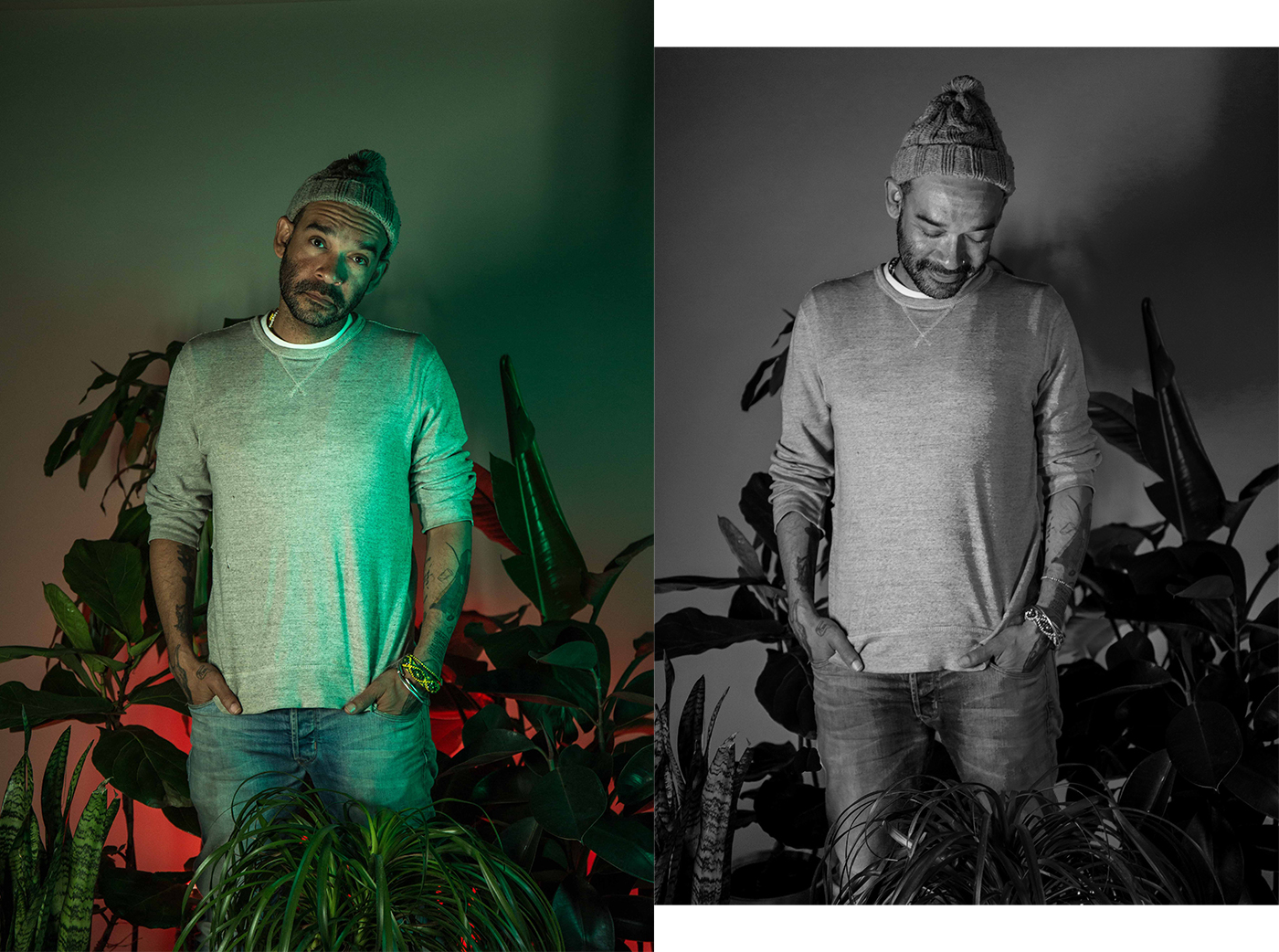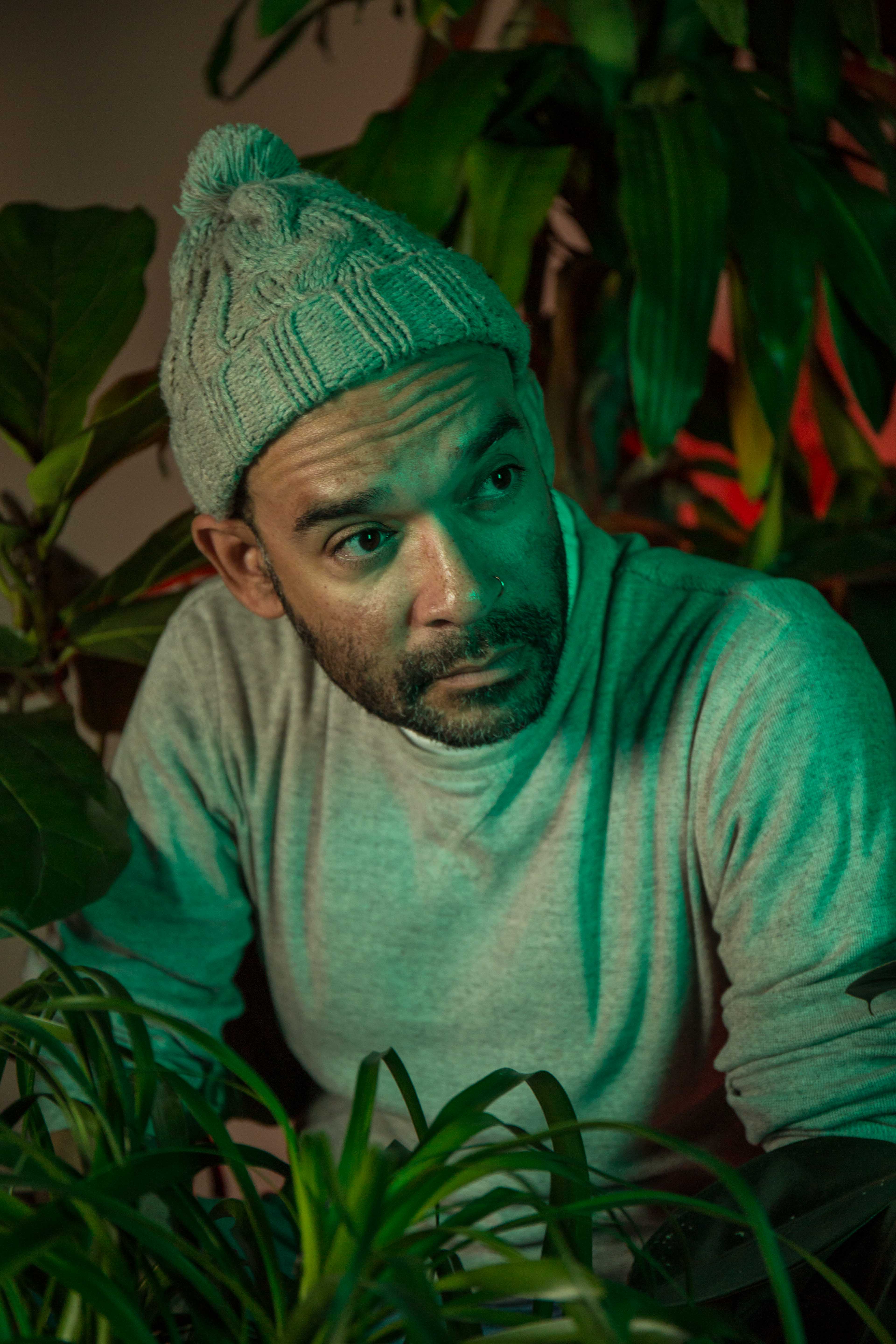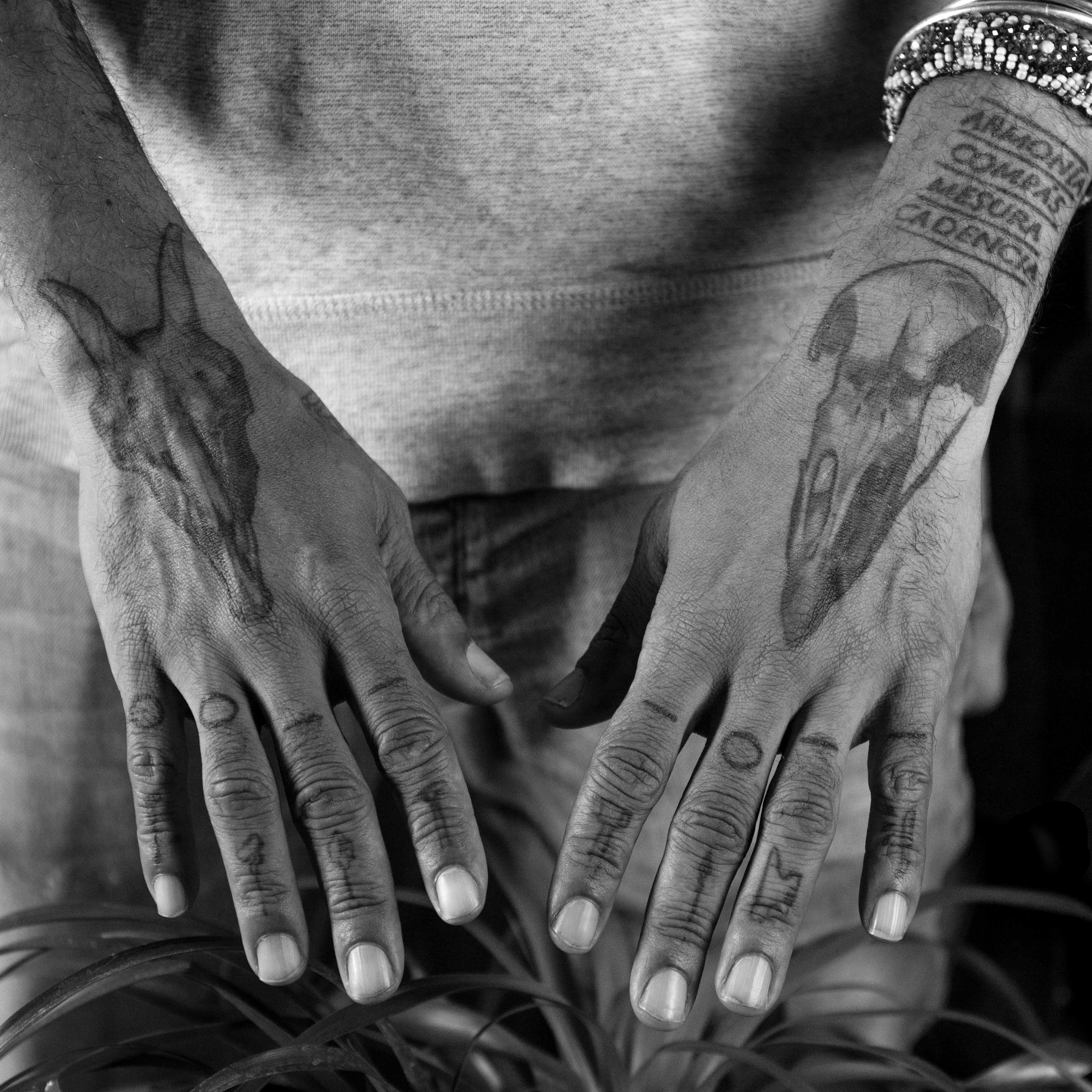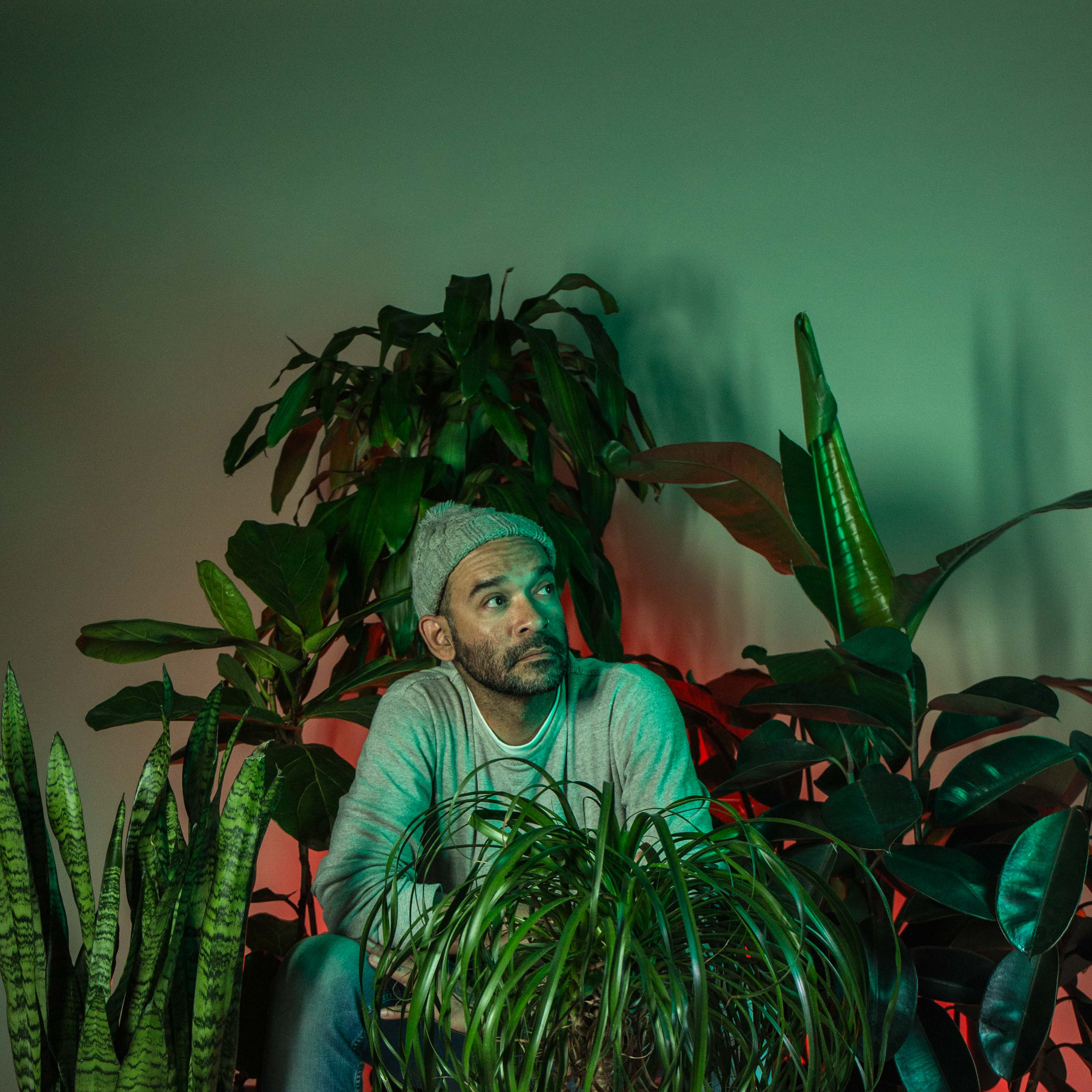I’m late and he was early, but Otura Mun does not seem pressed. He’s wearing white and has an easy demeanor. The leader of Afro-Caribbean electronic group ÌFÉ, Otura Mun – born Mark Underwood in Goshen, Indiana – is an easy talker, and I don’t have to ask too many questions for the stories to come spilling out. A true drummer, he punctuates his sentences by unconsciously drumming the table throughout our time together, as though he cannot help but be a percussionist in every moment.
It was a drumming scholarship that led Otura Mun to the University of North Texas, and campus life brought with it a flood of new music and expanded horizons. “I listened to pretty horrible music when I was a kid, other than rap,” he laughs, recalling the heavily white community where he grew up. “Me and this Korean kid listened to rap, exchanged tapes. Everyone else listened to heavy metal.” But in Denton, TX, he was exposed to a whole new world of music. One day, drumming in a funk group on the street, a DJ set up next to them and started scratching. “For me that was it,” he laughed. “I’d never seen a DJ cut it up.” That same night he got a flier for an underground hip-hop show in Dallas, where he saw a group of performers who blew him away. One of those performers that night was Erica Wright. “She later became Erykah Badu,” he added.

He loved this expression within hip-hop, but wasn’t sure where he’d fit in. He didn’t rap. He couldn’t dance. So one semester he made a reckless, fateful decision: he dropped his classes and used his student loan money to buy turntables and started to learn how to DJ.
“Both my ancestors and my elders inside of the religion are there to guide me.”
Around that same time, an airline messed up one of his flights between Indiana and Texas, and he got the free airline voucher that would change the course of his life. A fan of dancehall, he decided he wanted to go to Jamaica. But this airline didn’t fly there – another place in the Caribbean would have to do. Without a ton of plans or ideas of what he would do there, he used his voucher to book a ticket to Puerto Rico.
There was something about the island that resonated deeply within him. He heard music everywhere he went. He felt that his race wasn’t necessarily the most immediate defining factor of who he was there, not in the same way he had experienced growing up as a Black kid in a largely white community in Indiana. “I was like, ‘Ok, this dynamic is a bit shifted here. It’s a bit different.’ Which was refreshing.” The trip was a revelation, and after he got back, it stuck in his mind. But wasn’t until his brother’s sudden death in 1998 that he decided to go back. “I felt like an angry person in general, and before I let that anger destroy all my relationships in Texas I felt like I should leave,” he reflected. “I liked the world that I saw in Puerto Rico and thought, ‘This might be an opportunity to start fresh.’” And just like that – with a few crates of records and some clothes – he went back to Puerto Rico to see what life there could be.

He rented a room for a couple of weeks, and hung out at all the record shops and DJ nights he could find in San Juan – “there was a huge rave scene at the time,” he explained – and began befriending DJs. Eventually one of them would offer him a room for rent above a bar popular with DJs at the time. “Everyone who was poppin’ had a night there.” And every time someone didn’t show up, “which was a lot,” he laughed, they’d run up the stairs and knock on his door.
“I didn’t speak the language, but I was pretty good at [DJing].” Set by set, Otura Mun became a fixture in the music scene in San Juan. He eventually found himself opening for Puerto Rican group Superaquello, touring with Cultura Profética, and collaborating with musicians across the island. “I’ve been working in Puerto Rico’s music scene in one way or another since I stepped onto the island,” he says. “I didn’t do anything else.”
When he decided to put together the inspirations for ÌFÉ, he looked to Cuban rumba and Jamaican dancehall. “I wanted to make something with ÌFÉ that worked and moved like jazz moved,” he explained. But to him, jazz was already too much in a box. Rumba felt more open, more inspiring. He began to study it.

At the same time, he started consulting with a babalawo – an Ifá priest – who became his godfather in Ifá. “They were mutually exclusive decisions,” he explained, “but as I started studying more around Ifá it began to shift the way I saw everything, including music. And the two began to blend conceptually.”
ÌFÉ means “love” in Yoruba, but it can also mean “expansion.” The word felt like a good springboard from which to build a musical concept – ancestral, but to be understood as modern. He began to blend the basic concepts of rumba with the electronic sounds found in dancehall and the Yoruba praise songs he was learning in Ifá. To get these sounds with the improvisational qualities of jazz percussion, he rigged up a set of congas to add electronic sensors. These ingenious alterations allowed for the exact set of conditions that Otura Mun was seeking: a music that was electronic, improvisational, and percussive – music that moves with each moment, that is reflective of his journey, of Puerto Rico, and of its African diaspora. It culminated in the virtuosic debut album IIII + IIII, released in 2017.
“I’m a baby in this religion,” Otura Mun explains when I ask him about what the reaction from Ifá practitioners has been to his music. “As I am moving through this world as an artist I am hyper-aware that I am moving in a world that is informed by people who have moved in it before me. Both my ancestors and my elders inside of the religion are there to guide me.”

And while some practitioners have expressed their concerns about what he is doing with ÌFÉ, many others have reached out from around the world to express how meaningful his work has been to them. “There have been people who vehemently do not like what I’m doing, and they’re certainly entitled to their opinion…There are elders who feel that the things I’m doing inside of Ifá are inspiring for them, are inspiring for their godchildren.” Otura Mun knows that he can never make everyone happy, and at the same time is very serious about the connection between his art and his spiritual practice. “I’m aware that I’m going to make mistakes, just like a child makes mistakes. And I have to accept responsibility for those.”
“There are elders who feel that the things I’m doing inside of Ifá are inspiring for them.”
After Hurricane María, the music has provided some much-needed stability. As basic services like electricity and water continue to be spotty at best nearly a year later, and as the Puerto Rican diaspora grows and intensifies as a result of the storm, ÌFÉ is one constant. “Luckily, my whole band is [in Puerto Rico],” he explains. “And I think they stayed because they think they have a future there.” It hasn’t been easy for anyone in post-storm Puerto Rico, including musicians. The clubs were closed for months, which meant nobody hired musicians; this loss of income, for many, proved devastating. Otura Mun squared up his debts with everyone to make sure that anyone who depended on him had as much income as possible, and today his dedication to the music is also imbued with a sense of responsibility for the people who welcomed him on their island. “My job is to make sure that the project is running smoothly so that [my band is] employed for the next year.”
And there are big plans in place for that: the band will begin work on their next record once back home in Puerto Rico, shooting for a new album early next year. There’s no shortage of inspiration: “I have notebooks filled with ideas for that. I know what the record title is, I know what the cover looks like. I know the style. I just got to do it.”
For now, it’s all about making it work for him and for his band in Puerto Rico – how to make a record when electricity isn’t a given, how to do something that hasn’t been done with Afro-Caribbean music, how to keep up a connection that has spanned beyond speakers of the Spanish, English, and Yoruba of ÌFÉ’s lyrics. It’s not all perfectly mapped out, but things have always found a way to work for Otura Mun.
“In a lot of ways I’m living the dream. I wanted to play music and travel, play my own music. And I’m doing that.”
Catch ÌFÉ on tour in the U.S. this summer:
July 14th – New York, NY – LAMC at Central Park Summer Stage
July 15th – Philadelphia, PA – NuevoFest at World Cafe Live
July 28th – Berkeley, CA – Freight & Salvage







